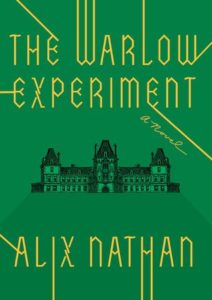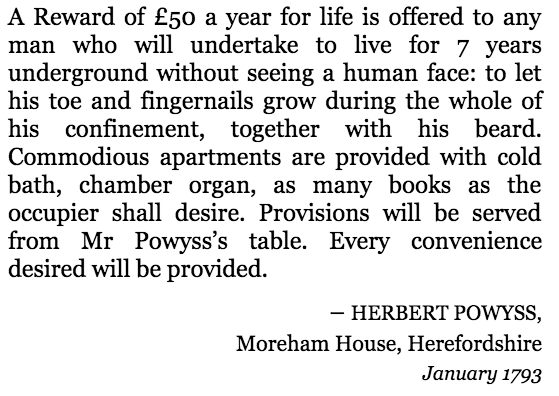18th-century horticulturalist majorly oversteps, ruins everything.
Named as one of the best books of the year (2019) by Daily mail, The Sunday Times (London), and the BBC. Ms. Nathan provides us with a lovely tale proving how disconnected men are from their emotions, and calls it “science”!
Now longlisted for the 2020 Walter Scott Prize for Historical Fiction!

“Herbert Powyss lives in an estate in the Welsh Marches, with enough time and income to pursue a gentleman’s fashionable investigations and experiments in botany. But he longs to make his mark in the field of science–something consequential enough to present to the Royal Society in London. He hits on a radical experiment in isolation: For seven years a subject will inhabit three rooms in the basement of the manor house, fitted out with rugs, books, paintings, and even a chamber organ. Meals will arrive thrice daily via a dumbwaiter. The solitude will be totally unrelieved by any social contact whatsoever; the subject will keep a diary of his daily thoughts and actions. The pay: fifty pounds per annum, for life. Only one man is desperate to apply for the job: John Warlow, a semi-literate laborer with a wife and six children to provide for. The experiment, a classic Enlightenment exercise gone more than a little mad, will have unforeseen consequences for all included.” – Doubleday
One of my favorite parts of this novel was how these 18th century housemaid women, mind you, would speak of their Master, Mr. Powyss. Here are some fine examples:
‘This is the only company he’ll ever have,’ she said, thrusting the warming pan down the bed. ‘Never taken a woman to bed, they say. Prefers vegetables.’
Do scientists get babes? Hell no! Only! Vegetables! Ouch.
By the way, what’s a warming pan? I didn’t know, but this guy made a video about it. No wonder there were so many raging fires…
Our housemaid hero Catherine doesn’t stop there.
After all these years could he really be more interested in her than his plants, trees and flowers? Surely not.
Our girl Catherine was so sure! Did I mention this torture-laden novel was a love story?
All in all, this was a story about a relatively successful botanist with major social anxieties. Because of his recognized anxieties, he wanted to scientifically explore this idea of isolation and human behavior, even though he has no background in the subject. He decides to write an advertisement for the paper. Couldn’t hurt, right?

Well, he had a taker. Enter: John Warlow, a semi-literate laborer and father of 6. He agrees to the conditions (7 years, no human contact, no clipping/cutting of his hair and nails, all while journaling daily), and signs off on the papers promising him 50 pounds a year for life. Even while surrounded by books he can’t read, art he doesn’t understand, and a giant instrumental organ he never plays, for some reason, Mr. Warlow still loses his mind. Truly mind-boggling.
Two stories below ground, Mr. Warlow begins degrading, but things greatly improve on the main level, particularly in the bedroom. Enter: Mrs. Warlow, an average middle-aged 1790’s Welsh woman with…nice eyes? Anyway, Master Powyss notices. From all angles, situations quickly escalate, and characters are left hurt, dead, loved, or alone.
Reading Experience
I spent 5 days with this novel, which is longer than I usually would for a book of 260-something pages. I found it hard to keep this book in my hands, not because it wasn’t interesting to me, but it’s full of heavy personal challenges. Watching (and feeling) characters work through their tough stuff was, to me, mentally exhausting.
I did rate it 4 stars on my Goodreads account. Mostly due to it’s originality. I wouldn’t say I was surprised by anything that took place, but that’s to be expected in a character-driven story. I appreciated the vernacular, and I appreciated the women in this book. I also appreciated these quotes I snagged for you…
Feelings of acceptance and guilt, over a winter garden scene:
Everything that needed to drop leaves had done so, stood waiting. Endured whatever came. Anything that could burst through frozen earth would do it with or without him.
‘Oh, I cannot abide fish,’ says the florid woman. ‘It does not agree with my constitution at all.’ ‘Madam,’ says an earnest man with sandy hair, ‘I shall correct you, for a fish is in no position either to agree or to disagree with you, it having neither speech nor learning, nor any command of logic. Moreover, it having been cooked, its brain or seat of learning, even if it possessed learning, which, as I said, it does not, would have been rendered inactive. And as to your having a constitution, with which the fish might agree or disagree, there I must correct you again, a constitution being rightly an ordinance or decree, the form of government used in any place or the law of a Kingdom and as to your being a Kingdom, Madam…’
She sees how he holds himself still, stiff, dry and hard like a dead tree no insects or birds have wanted to eat or inhabit.